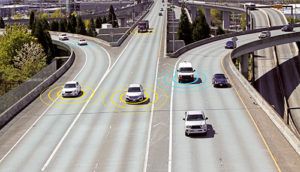

A new telematics study by LexisNexis Risk Solutions found that most car buyers don’t seek out advanced safety and connectivity features in new cars, however 76 percent of connected car owners are pleased when they discover the benefits of having and using them in their vehicles, and that safety is a motivation for using them. This mind shift presents new opportunities for automakers to partner with insurers to increase adoption of usage-based insurance (UBI) and other telematics-driven offerings in order to deliver a superior customer experience.
In its sixth year, the 2017 LexisNexis Telematics Usage-Based Insurance Study, which follows top topics and trends regarding telematics, studied consumer awareness of advanced driver-assisted systems (ADAS) and connected car features to gauge their impact on telematics adoption. It revealed that only 15 percent of consumers seek out ADAS and only 19 percent seek out connected car features when car shopping. As a result, most of the car-buying population merely have these features because their cars were factory equipped with them. But regardless of whether a driver purchases a vehicle for its specific features, the survey found that 76 percent of ADAS car owners and 65 percent of connected car owners had a more favorable opinion of ADAS/connected cars after personally experiencing the features in their car.

“Consumers seek out products and services that make their lives easier, safer and add value, so drivers are ready for and desire connectivity in their vehicles, and they are even willing to share their driving information because they see the value that ADAS and connectivity can deliver,” said Pavan Mathew, director of OEM at LexisNexis Risk Solutions. “The study revealed that the more engaged consumers are with ADAS and connectivity, the more favorable their opinions of UBI. Working together, insurers can leverage this attitude shift to drive UBI adoption while automakers can use the information to develop more valuable products and services that their customers want.”
When it comes to connected cars, the telematics study reveals key items that would motivate drivers to shop specifically for a ADAS or connected vehicles, suggesting implications for insurers and automakers as they refine their offerings.
Safety First – When looking at the benefits of ADAS and connected cars, safety ranked the most important benefit to drivers both for ADAS (80 percent) and for connected cars (69 percent). Owners of vehicles equipped with ADAS have also indicated that they have seen tangible value and benefit in terms of safety improvements as a result, which is why both automakers and insurers should promote these results and positive sentiments to help drive adoption.
Customization of Features – While features such as adaptive cruise control, automatic braking, GPS/traffic warnings, smartphone connectivity, and lane change alerts are all seen as valuable features, the study found that car owners want some control of these features. More than one-third of car owners with ADAS features (36 percent) and half of connected car owners (50 percent) would like to be able to disable some or all of these features.
The biggest perceived drawbacks for ADAS are features working properly and the amount of control a driver would still have over their vehicle. For connected car features, there is concern that it adds new distractions to the driving experience. The key takeaway for automakers is that consumers want more ownership of the features available in their cars, and with over-the-air connected car updates, automakers should consider enabling greater customization of these features.
Privacy Matters when ADAS and Connected Car are Mechanisms for UBI – Privacy regardingdriving information shared through ADAS and connected car features is also a universal concern across all respondents. Seven-in-ten respondents cite personal privacy concerns as the main reason they are less interested in ADAS if it enables UBI.
Consequently, insurers and automakers should make privacy and security a top priority with their new UBI offerings. The more transparent and convenient the program, the less likely they are to encounter barriers to adoption.
The study also revealed that the majority of consumers have positive opinions of UBI, especially for those engaged with ADAS and connected car features. These findings indicate that the timing is right to escalate UBI adoption, and that promoting the correlations ADAS and connected car features have to UBI, along with safer driving results and subsequent lower insurance rates, could help expedite that adoption. To that end, insurers and automakers should deepen their understanding of what consumers want with regards to car connectivityand improve their educational outreach and campaign promotions to focus on the extended benefits of ADAS and connected cars.
“This unfolding consumer dynamic presents a unique opportunity for automakers to work with insurers to design services around the cars of the future,” said Mathew. “Sharing telematics data helps to strengthen the partnership between automakers and insurers and enables the delivery of valuable, customer-friendly features that help their shared customers be safer drivers, while also opening the door for new business opportunities.”
For more information, download the 2017 LexisNexis Telematics Usage-Based Insurance Study
Source: LexisNexis Risk Solutions